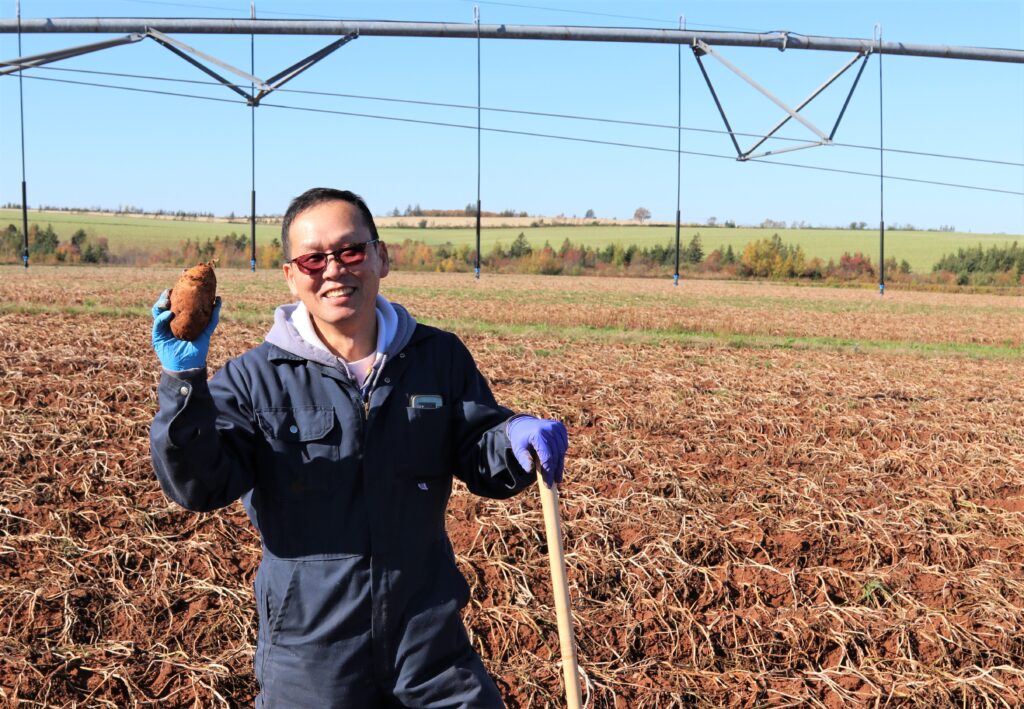
Features
Research
Soil
Online calculator helps determine irrigation schedule
August 14, 2023 By Agriculture and Agri-Food Canada
 Dr. Jiang at a P.E.I. farm research site for the supplemental irrigation project as part of Living Lab - Atlantic. Courtesy AAFC.
Dr. Jiang at a P.E.I. farm research site for the supplemental irrigation project as part of Living Lab - Atlantic. Courtesy AAFC.Agriculture and Agri-Food Canada research scientist Dr. Yefang Jiang recently completed a study on how scheduling supplemental irrigation, only when the crop needs it, impacted potato yields on several P.E.I. farms from 2019 to 2022.
Jiang spent the last four years on the study as part of the recently completed Living Lab – Atlantic project – a collaboration with farmers and scientists where research is completed on real farm fields to help increase adoption of environmentally friendly farming practices.
His approach looked at moisture levels in the soil and which level provided the optimal environment for increasing potato yield and quality.
“Less moisture in the soil means the potato plant can’t effectively pull water and nutrients from the soil and that reduces yield and quality,” says Jiang. “However, if soil moisture is too high, it can reduce yield and quality by damaging the potato root system. Finding the right balance of soil moisture helps potatoes grow and also reduces water usage.”
He found that irrigation scheduling wasn’t just determined by the moisture in the soil, it also must factor in the growth stage of the potato crop, soil type, as well as the short-term weather forecast. To help P.E.I. farmers determine when or when not to irrigate, Jiang designed an online calculator with help from Dr. Morteza Mesbah, Kristen Murchison and Scott Anderson from AAFC to reduce the risk of over-, or under-irrigating potatoes by accounting for all these factors.
Living Lab – Atlantic partner Ryan Barrett from the P.E.I. Potato Board helped test and provided feedback on the calculator to the team.
The calculator, available on the East Prince Agri-Environment Association (lead Living Lab – Atlantic partner) website, allows farmers to enter the soil type on their farm, growth stage of their potato crop, the current soil moisture level taken by a soil moisture metre, the seven-day rainfall forecast (in millimetres), as well as the efficiency of their irrigation system to provide water to the crop.
For example, a low-pressure centre pivot with drop tubes applies water at 80 to 85 per cent efficiency and a high-pressure pivot with impact nozzles is about 75 per cent efficient. The calculator then provides an exact amount of water to apply to the field in millimetres and inches, or indicates that no irrigation is necessary if the crop has all the moisture it needs. Jiang explains that adopting use of the calculator will be easy for P.E.I. farmers.
“They just need a hand-held soil moisture meter to monitor every few days, watch short term weather forecast, and then use the calculator to determine whether to water or not,” says Jiang. “Some farmers might be using less water than they need, where others might be using more than they need. The calculator will determine an optimal supplemental irrigation rate, and in turn will reduce water use.”
The calculator will also help farmers increase their potato yield and quality as it provides information on the optimal moisture the crop requires at various growth stages. Jiang explains that he will work with four P.E.I. farmers to collect more data to continually improve the tool. He is encouraging as many farmers as possible to start using the tool right away in order to use science to support responsible water use.
Visit here for the full study.
Print this page